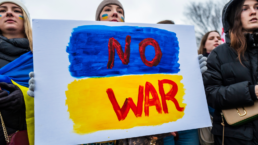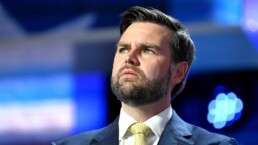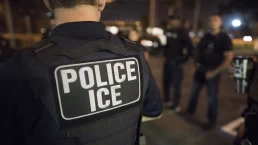Militarism by both Russia and the U.S. is hypocritical and horrific. The real enemy is war itself.
By Norman Solomon
Russia’s war in Ukraine — like the USA’s wars in Afghanistan and Iraq — should be understood as barbaric mass slaughter. For all their mutual hostility, the Kremlin and the White House are willing to rely on similar precepts: Might makes right. International law is what you extol when you aren’t violating it. And at home, rev up the nationalism to go with the militarism.
While the world desperately needs adherence to a single standard of nonaggression and human rights, some convoluted rationales are always available in a quest to justify the unjustifiable. Ideologies get more twisted than pretzels when some people can’t resist the temptation to choose up sides between rival forces of terrible violence.

In the United States, with elected officials and mass media intensely condemning Russia’s killing spree, the hypocrisy can stick in the craw of people mindful that the Afghanistan and Iraq invasions started massive protracted carnage. But U.S. hypocrisy in no way excuses the murderous rampage of Russia’s war on Ukraine.
At the same time, hopping on a bandwagon of the U.S. government as a force for peace is a fantasy journey. The USA is now in its twenty-first year of crossing borders with missiles and bombers as well as boots on the ground in the name of the “war on terror.” Meanwhile, the United States spends more than 10 times what Russia does for its military.
It’s important to shed light on the U.S. government’s broken promises that NATO would not expand “one inch eastward” after the fall of the Berlin Wall. Expanding NATO to Russia’s border was a methodical betrayal of prospects for peaceful cooperation in Europe. What’s more, NATO became a far-flung apparatus for waging war, from Yugoslavia in 1999 to Afghanistan a few years later to Libya in 2011.
The grim history of NATO since the disappearance of the Soviet-led Warsaw Pact military alliance more than 30 years ago is a saga of slick leaders in business suits bent on facilitating vast quantities of arms sales — not only to longtime NATO members but also to countries in Eastern Europe that gained membership. The U.S. mass media are on a nonstop detour around mentioning, much less illuminating, how NATO’s dedication to avid militarism keeps fattening the profit margins of weapons dealers. By the time this decade began, the combined annual military spending of NATO countries had hit $1 trillion, about 20 times Russia’s.
After Russia launched its invasion of Ukraine, denunciations of the attack came from one U.S. antiwar group after another after another that has long opposed NATO’s expansion and war activities. Veterans For Peace issued a cogent statement condemning the invasion while saying that “as veterans we know increased violence only fuels extremism.” The organization said that “the only sane course of action now is a commitment to genuine diplomacy with serious negotiations — without which, conflict could easily spiral out of control to the point of further pushing the world toward nuclear war.”
The statement added that “Veterans For Peace recognizes that this current crisis did not just happen in the last few days, but represents decades of policy decisions and government actions that have only contributed to the building of antagonisms and aggressions between countries.”
While we should be clear and unequivocal that Russia’s war in Ukraine is an ongoing, massive, inexcusable crime against humanity for which the Russian government is solely responsible, we should be under no illusions about the U.S. role in normalizing large-scale invasions while flouting international security. And the geopolitical approach of the U.S. government in Europe has been a precursor to conflict and foreseeable calamities.
Consider a prophetic letter to then-President Bill Clinton that was released 25 years ago, with NATO expansion on the near horizon. Signed by 50 prominent figures in the foreign-policy establishment — including a half-dozen former senators, former Defense Secretary Robert McNamara, and such mainstream luminaries as Susan Eisenhower, Townsend Hoopes, Fred Ikle, Edward Luttwak, Paul Nitze, Richard Pipes, Stansfield Turner and Paul Warnke — the letter makes for chilling reading today. It warned that “the current U.S.-led effort to expand NATO” was “a policy error of historic proportions. We believe that NATO expansion will decrease allied security and unsettle European stability.”
The letter went on to emphasize: “In Russia, NATO expansion, which continues to be opposed across the entire political spectrum, will strengthen the nondemocratic opposition, undercut those who favor reform and cooperation with the West, bring the Russians to question the entire post-Cold War settlement, and galvanize resistance in the Duma to the START II and III treaties. In Europe, NATO expansion will draw a new line of division between the ‘ins’ and the ‘outs,’ foster instability, and ultimately diminish the sense of security of those countries which are not included.”
That such prescient warnings were ignored was not happenstance. The bipartisan juggernaut of militarism headquartered in Washington was not interested in “European stability” or a “sense of security” for all countries in Europe. At the time, in 1997, the most powerful ears were deaf to such concerns at both ends of Pennsylvania Avenue. And they still are.
While apologists for the governments of Russia or the United States want to focus on some truths to the exclusion of others, the horrific militarism of both countries deserves only opposition. Our real enemy is war.
Norman Solomon is the national director of RootsAction.org and the author of a dozen books including Made Love, Got War: Close Encounters with America’s Warfare State, published this year in a new edition as a free e-book. His other books include War Made Easy: How Presidents and Pundits Keep Spinning Us to Death. He was a Bernie Sanders delegate from California to the 2016 and 2020 Democratic National Conventions. Solomon is the founder and executive director of the Institute for Public Accuracy.
Recent Posts
Is A Citizens United 2.0 Right Around The Corner?
July 15, 2025
Take Action Now Is it possible for American democracy to be further degraded by the influence of billionaires? Thanks to champion of the working…
U.S. Leaders Gave Up On Diplomacy With Iran. We Must Make Them Return To It.
July 15, 2025
Take Action Now Building an antiwar movement means preventing the systemic U.S. aggression that creates the conditions for war.By Hanieh Jodat,…
What To Do When You See ICE In Your Neighborhood
July 14, 2025
Take Action Now How can you deter the Trump administration’s immigrant deportation machine when it pops up in your community? Follow these…
ICE Campaign Of Violence Will Lead To More Deaths
July 14, 2025
Take Action Now Jaime Alanis’s death shows the horrific consequences of a secret police force behaving with utter impunity.By Natasha Lennard, The…




